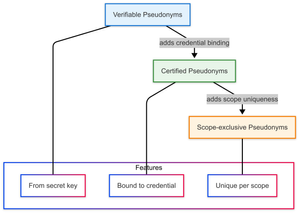Building the Future of Digital Privacy: How you can Contribute, Implement, and Advocate
The applied cryptography community is making significant strides in standardizing BBS signatures and their extensions - a crucial development for privacy-preserving digital credentials. This work represents a major step forward in enabling more private and secure digital interactions while maintaining the necessary balance between privacy and accountability.
What is BBS?
BBS is a secure digital signature mechanism that proves information is authentic and unchanged, similar to how a notary validates physical documents. Unlike other digital signature mechanisms, BBS enables powerful privacy features while maintaining security. Its name comes from its creators – cryptographers Dan Boneh, Xavier Boyen, and Hovav Shacham. This combination of security and privacy makes it particularly well-suited for digital credential systems, where protecting both authenticity and user privacy is crucial.
Why BBS Matters
BBS signatures provide a unique combination of privacy and practical utility that makes them especially valuable for digital credentials.
From a technical perspective, BBS stands out for:
- Constant-size signatures regardless of the number of messages signed
- True unlinkability between different uses of the same credential
- The ability to sign and selectively reveal multiple messages within a single signature
These technical properties translate into practical benefits for digital credentials:
- Selective disclosure: Users can prove specific facts about their credentials (like their city of residence) without revealing other details (like their full address)
- Unlinkable disclosure: Each privacy-preserving use of a credential cannot be traced to other uses
- Anti-theft features: Credentials can be cryptographically bound to their owner while maintaining privacy
- Controlled recognition: Services can securely recognize returning users without enabling cross-service tracking
Together, these capabilities enable privacy-preserving digital credentials that are both secure and practical for real-world deployment - from government IDs to professional certifications to age verification systems.
BBS Standards Landscape
The standardization of BBS involves several complementary efforts across standards bodies:
Core Technical Specifications
BBS and its extensions are currently undergoing standardization within the Crypto Forum Research Group (CFRG) of the Internet Research Task Force (IRTF). (The IRTF is related to the IETF but focuses on longer term research related to the Internet.)
The Decentralized Identity Foundation hosts the development of this work in the Applied Crypto Working Group.
This work is currently represented by 3 specifications:
- "BBS Signatures": BBS Signatures are a privacy-preserving way to sign digital credentials. They let you prove specific facts about your credentials (like your city of residence) without revealing other details (like your full address). Specification: The BBS Signature Scheme
- "Blind BBS": Blind BBS enables credential issuance where the issuer can cryptographically sign information without seeing its contents - useful for privacy-preserving identity binding. Specification: Blind BBS Signatures
- “BBS Pseudonyms”: BBS Pseudonyms are an anti-fraud mechanism to prevent digital credential cloning. They can be used by verifiers (like websites) to identify someone they've interacted with before, but in a way that cannot be correlated across different verifiers. Specification: BBS per Verifier Linkability
Status: The first item, BBS Signatures, is a mature working group document that completed an initial review by the CFRG panel. The other two – Blind BBS and BBS Pseudonyms – are on their way to adoption, and they could benefit from your support, as described below.
Implementation Standards
The W3C Verifiable Credentials Working Group is building on this foundation by developing the Data Integrity BBS Cryptosuite specification. This work integrates BBS signatures into W3C Verifiable Credentials, provides comprehensive test suites, and ensures that implementations across different platforms will be interoperable and reliable.
Call to Action
1. Voice Your Support
Urgent: Deadline December 20th, 2024
The CFRG has opened an official adoption call for both the Blind BBS and BBS Pseudonyms specifications. This is a crucial moment for these privacy-enhancing technologies.
Update: these specifications have been accepted! Thank you for your support.
Your voice matters - if you care about privacy-preserving technologies, please participate in the vote and share your support.
2. Get Involved
Want to dive deeper into this work? There are several ways to engage based on your interests:
- Developers: Contribute to W3C test suites or implement any of the specifications to test them out
- Standards developers: Join the discussion at any of the above standards groups
- Cryptographers: Review and provide feedback on the specifications and join the technical discussions
- Enthusiasts / everyone: If you want to follow along with the progress, subscribe to DIF’s blog for updates
To participate in DIF’s Applied Crypto Working Group, you can join DIF; contact us at membership@identity.founation if you have any questions.


